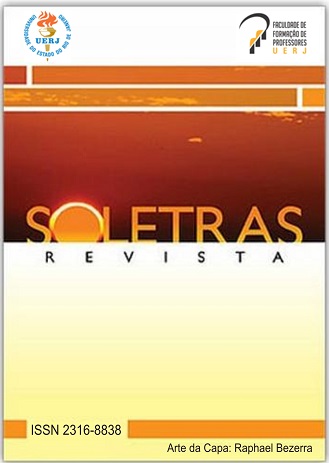Fictivity in Vogue: a cognitive-functional categorization of fictive speech acts in a fashion corpus using corpus linguistics
DOI:
https://doi.org/10.12957/soletras.2021.56129Keywords:
Cognitive Linguistics, Corpus Linguistics, Fictive Speech, FashionAbstract
Fashion pervades different instances of culture, ranging from clothes to language and behavior. In this paper, we analyze the occurrence of three fictive speech categories (PASCUAL, 2014) as storytelling strategies in sections of North American Vogue magazine. This paper aims at investigating through a mixed-method approach cognitive-functional categories of fictive speech acts based on a corpus analysis of a corpus with fashion texts. We collected 200 texts from Vogue magazine (printed edition) from 2015 to 2018. In a sample of 60 texts, sentential (SENT), intra-sentential (INTRA) and inter-sentential (INTER) fictive acts were manually identified and categorized in each text through tags. The quantitative analysis mapped the counts of each category per year and per text and the qualitative in-depth analysis investigates instances from each category and their interpretation in the light of Fashion and cognitive and corpus linguistics theories. The findings show that the occurrence of the categories of fictive speech acts varies per year with opposing trends, though they tend to co-occur in the same texts. Therefore, fictive speech acts function as recurrent discursive strategies to foster a conversational environment in texts from Vogue magazine.Downloads
Published
Issue
Section
License
The approval of the article implies the immediate and free transfer of the publication rights in this journal. The author (s) authorize the Postgraduate Program in Literature and Linguistics (PPLIN) to reproduce it and publish it in Revista SOLETRAS, understanding the terms "reproduction" and "publication" in accordance with Definition of article 5 of Law 9610/98. The author (s) will continue to own the copyright for subsequent publications. The article can be accessed by the world wide web (http://www.e-publicacoes.uerj.br/index.php/soletras), being allowed, free of charge, the consultation and the reproduction of copy of the article for own use. Cases of plagiarism or any illegalities in the submitted texts are the sole responsibility of their authors.



